🔥 Whitespark's Local Ranking Grids are coming soon! Get notified when we launch
🔥 Whitespark's Local Ranking Grids are coming soon! Get notified when we launch

This is my talk from MozCon 2018 turned into a blog post!
1. Google is sending less traffic to websites from local results.
Clicks to your website from GMB are down. Google has been adding a ton of features to local results, so that you don’t need to visit the website. You can get all of the info you need right in the local search results. You can no longer rely on just having an awesome website to get conversions. You need to make your listing awesome, and reviews are one of the most powerful ways to do this.
Local results used to take you to a business website, now you’re taken to the Local Finder which has almost everything someone would need to know about a business, and if your listing doesn’t have the info, don’t count on the user clicking through to your website – they’re more likely to just move on to the next business – so make sure you add all the things to your listing and get reviews!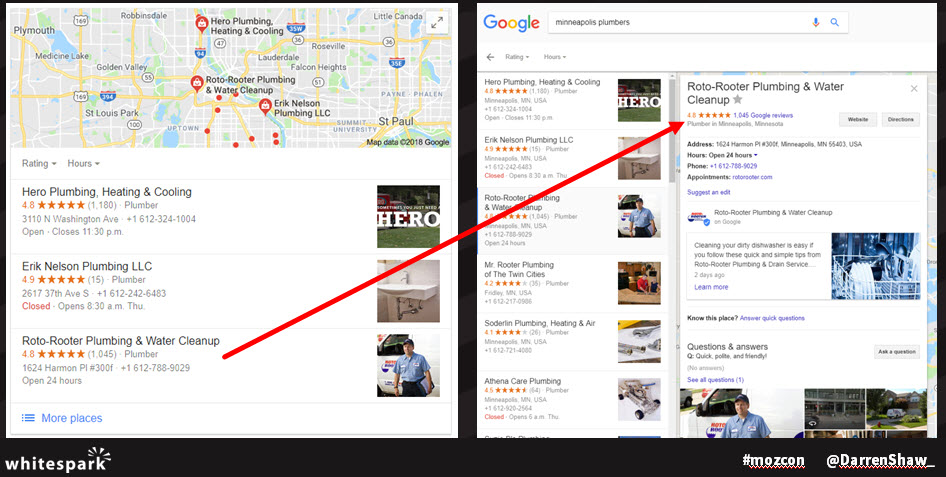 2. Reviews help rankings.
2. Reviews help rankings.
In the 2017 Local Search Ranking Factors, we saw an increase of 21.53% in the importance of Review Signals. Local search practitioners are noticing the powerful impact that reviews can have on rankings. Some of it is likely direct, but a side ranking benefit might come from engagement factors. Listings with more reviews are going to get more clicks and users will spend more time looking at those listings.
It’s important to make your listing stand out from the competition, and the only differentiating factor in local pack results is reviews.
Which business would you call? But, this opportunity won’t be around forever. What will the local packs look like in 2, 3, or 5 years from now when everyone has one hundred 5 star reviews. It won’t be a differentiating factor anymore. The time is now, people.
But, this opportunity won’t be around forever. What will the local packs look like in 2, 3, or 5 years from now when everyone has one hundred 5 star reviews. It won’t be a differentiating factor anymore. The time is now, people.
Don’t miss this opportunity!
In 2015 Eager Beaver Moving company in Edmonton had a total of 4 Google reviews averaging a 4.2 rating. They were getting about 20 leads/month from Google.
Over the course of the next few years, they started asking customers to leave them reviews and as of today they have 83 Google Reviews and a 4.8 rating. Now they are getting 350 leads/month from Google. They’ve seen a 1,650% increase!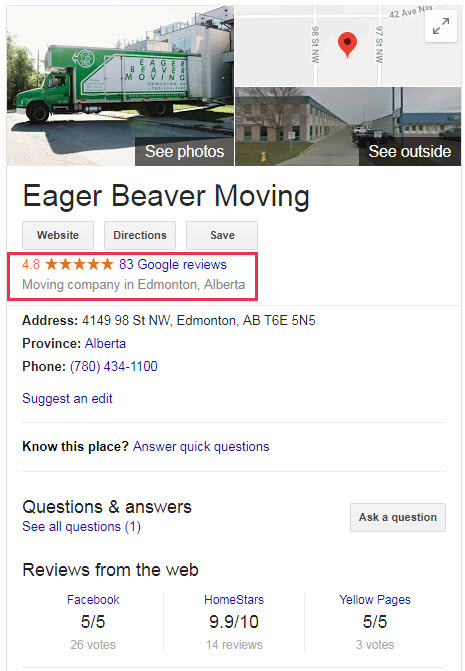 And a huge side benefit is that their leads are already presold. Eager Beaver doesn’t need to send them a quote and try to convince the prospect that they are the best moving company. They don’t need to, because their past customers have become their sales force through the Google reviews and have already convinced the prospect that Eager Beaver is the best. They call in ready to commit, and just want to know: “when can you start?”
And a huge side benefit is that their leads are already presold. Eager Beaver doesn’t need to send them a quote and try to convince the prospect that they are the best moving company. They don’t need to, because their past customers have become their sales force through the Google reviews and have already convinced the prospect that Eager Beaver is the best. They call in ready to commit, and just want to know: “when can you start?”
“Great experience with the Eager Beaver team, they were professional, upfront, friendly and efficient- definitely the best moving company I have ever worked with.” Kelly Scott
reviews have revolutionized his business.
So you’re now convinced that reviews are awesome and you’re going to work on getting more of them. Good. Here are a bunch of suggestions for how you can encourage more reviews from your customers.
A) Golden Rule – Ask every customer.
Honestly, if you only do this, you’re 80% of the way there. So many businesses shy away from asking because they are worried they’ll get some negative reviews. What you’ll find is that if you don’t ask, your reviews will skew towards the negative. If you start asking ALL your customers, then the happy ones will be encouraged to support you too and your reviews will start to skew towards the positive.=B) Platinum Rule – Always follow up.
People might not leave you the review on the first try, so always remember to send a follow up a week later. You’ll get 32.7% more reviews if you send a follow up. Where does that 32.7% number come from? My brain – I made it up – but seriously, you will definitely get more reviews when you follow up, so just do it, ok?
C) Get a link to leave a Google review.
If you’re going to ask someone to leave you a review, it’s a good idea to make it easy on them and include a link to your Google listing. But… what is the link? Fortunately for you we have created a free tool to generate a link to leave a review on Google.
Got the link? Great. Now use this link everywhere:
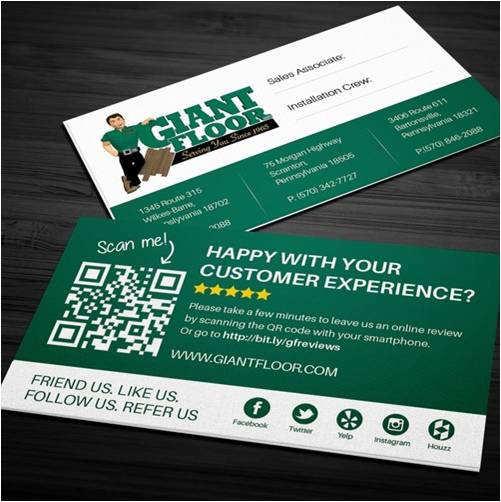
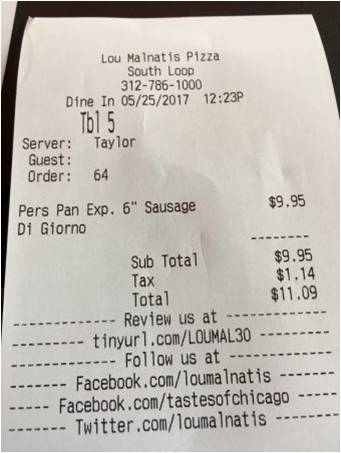
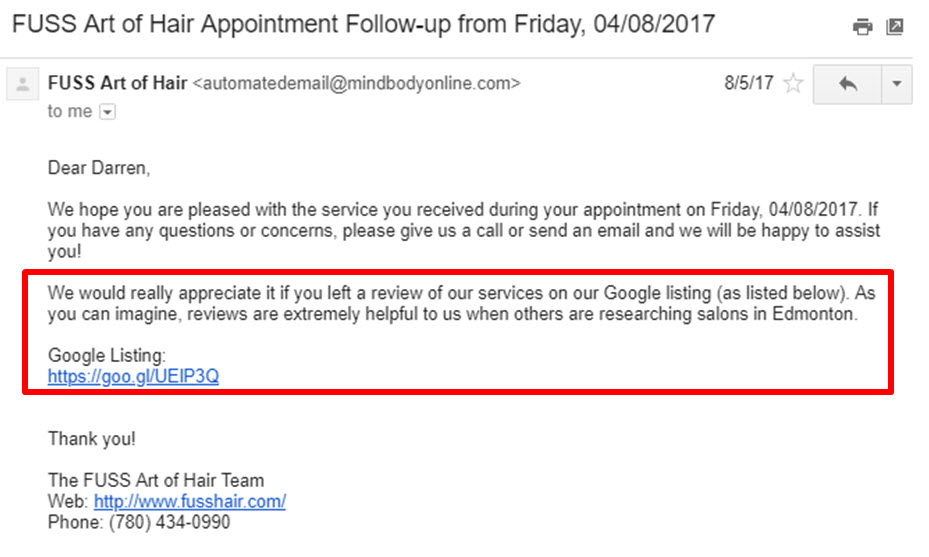
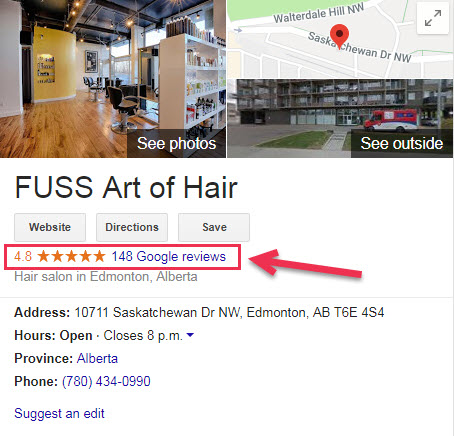
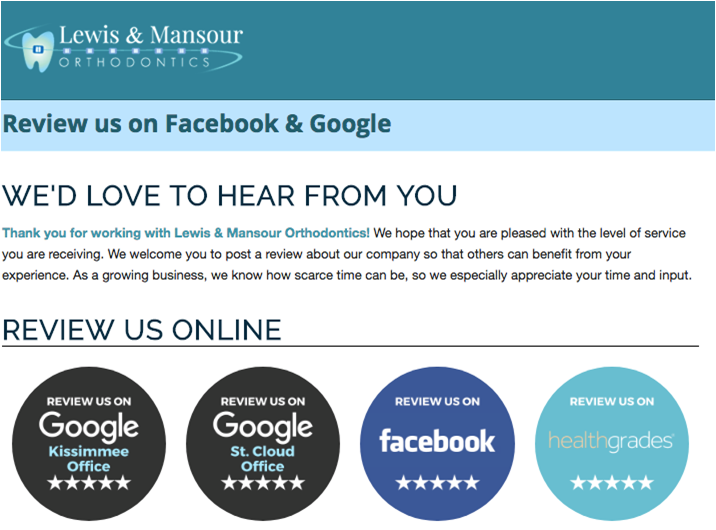 D) Use software.
D) Use software.
There are a number of software systems on the market that can help with automating the review ask process through email/sms and can provide detailed monitoring and reporting (like our our Reputation Builder). This kind of setup is ideal for high-volume retail businesses that can’t do a personal ask.
E) Add testimonials and schema markup to your pages.
Note! You can only markup direct 1st-party reviews/testimonials. It is against Google’s guidelines to copy your reviews from Google or other review sites and mark them up. If you’re not sure how to do this, we’ve got you covered with our post: How To Get Review Snippets in Google with aggregateRating Schema
F) Implement a digital loyalty program.
This one is also helpful for high volume businesses like retail and restaurants where it’s awkward to ask your customers for an email address. If you implement a digital loyalty program then it’s a great way to collect email addresses that you can then use to ask for a review.
In the 2017 Local Search Rankings Factor Survey results, having keywords in your reviews ranked #26 for Pack/Finder Factors & #17 in Competitive Difference Maker factors. Getting keywords in your reviews can definitely help you rank better for those keywords. your review email from generic to explicit and get reviews that are rich with details.
Basic Ask: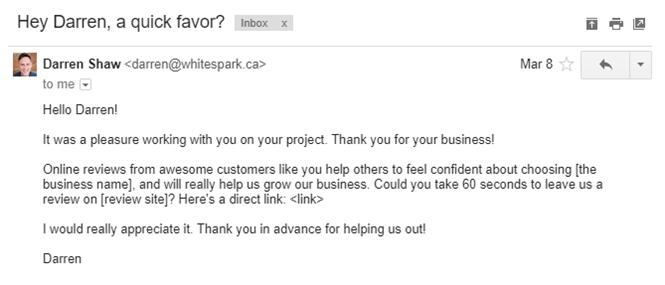 Enhanced Ask:
Enhanced Ask: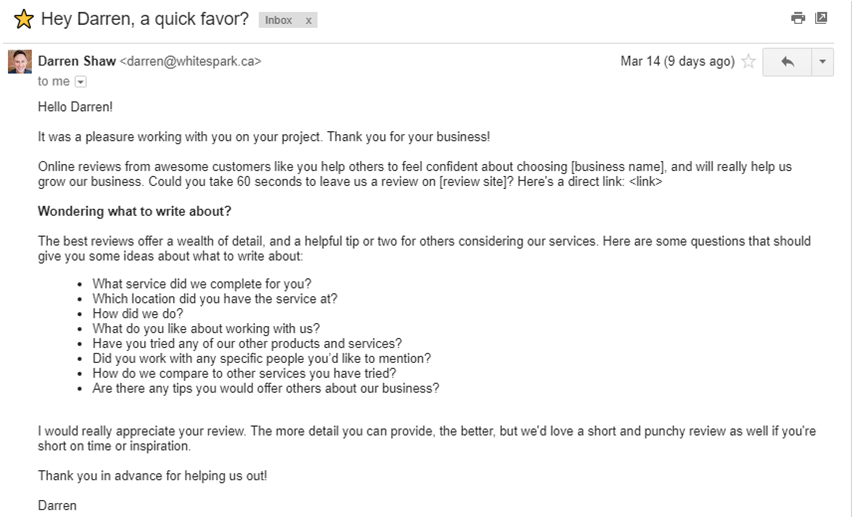 Learn more about how to get keywords in your reviews with this quick help video.==
Learn more about how to get keywords in your reviews with this quick help video.==
Pro Tip: while you can’t incentivize the customers, you CAN incentivize your employees. Employees that get a bonus for the reviews will be much more inclined to ask, and as a side benefit, they’ll also provide better customer service when they know a public review may be coming.

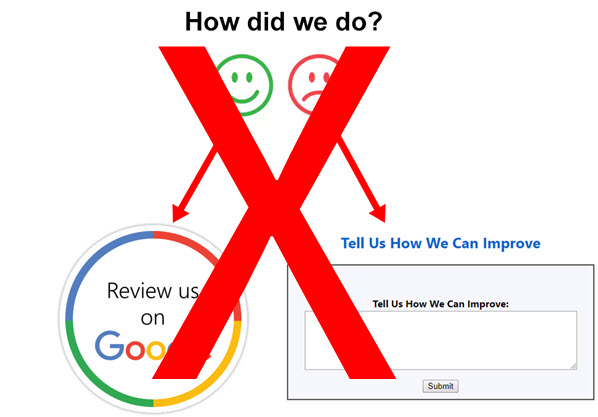
Don’t put all your review eggs into the Google basket. It’s important that your business is getting reviews on other sites as well.
I have two suggestions for how you can identify which other review sites are important for your business.
1) Search your full business name and address and see what sites come up. If there are sites on this branded search that offer reviews, then those are sites you should be getting reviews on.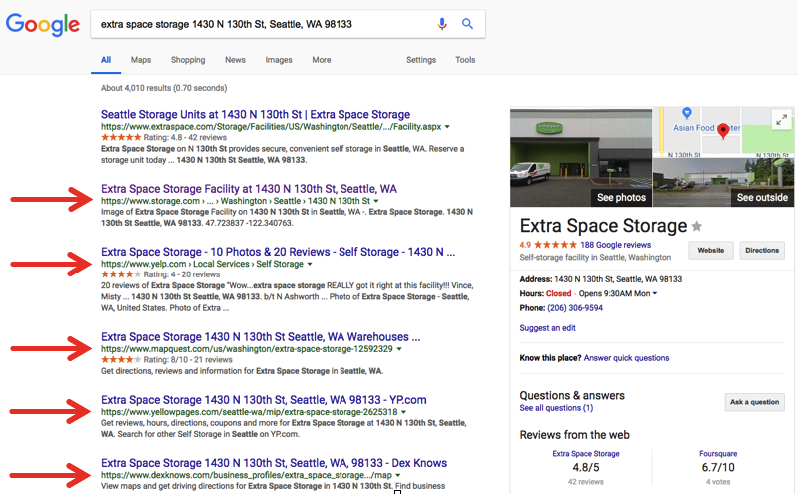 2) Run a generic search for your business type and location – ie. Seattle Plumbers and see what review sites come up. These are also going to be important review sites for your industry.
2) Run a generic search for your business type and location – ie. Seattle Plumbers and see what review sites come up. These are also going to be important review sites for your industry.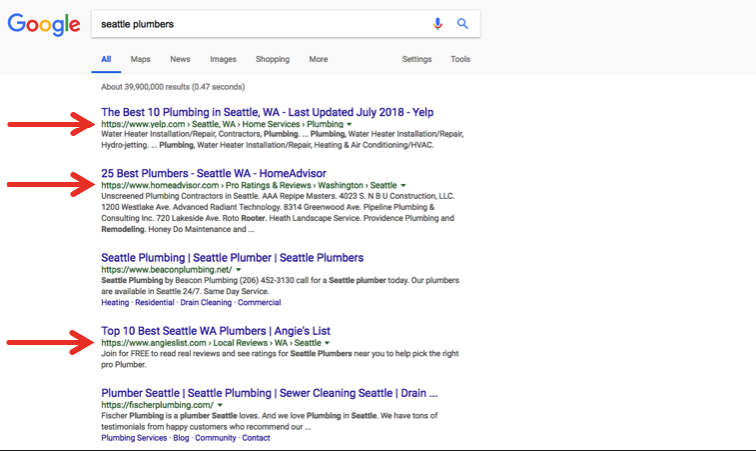 Now that you have identified the other sites you should be getting reviews on, rotate these sites into your review asks.
Now that you have identified the other sites you should be getting reviews on, rotate these sites into your review asks.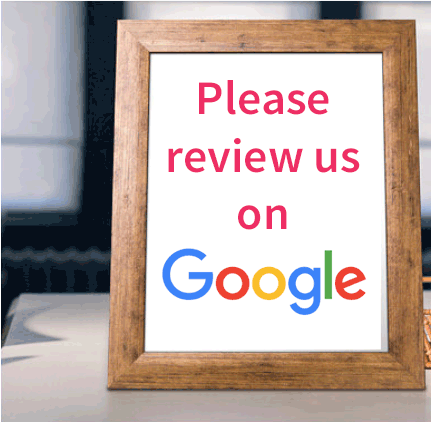
Yelp is a tough one. The site has huge visibility and authority. You’re going to see it ranking in your branded searches and your keyword searches.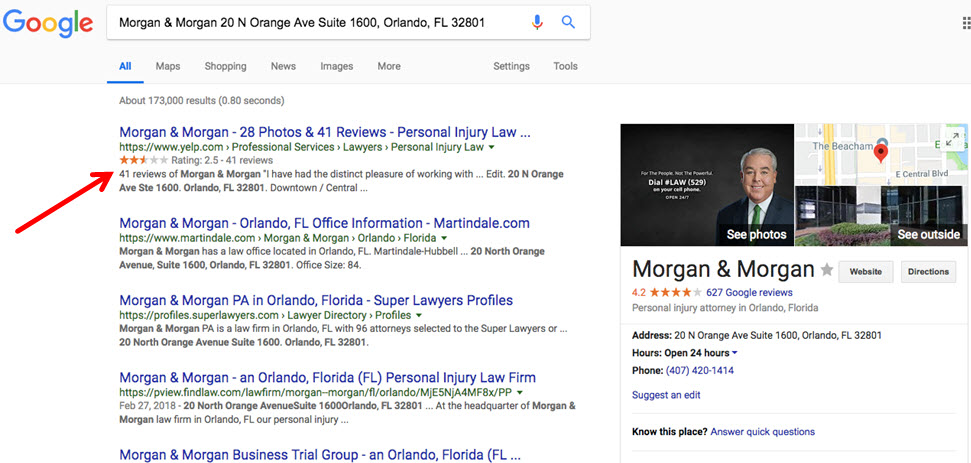
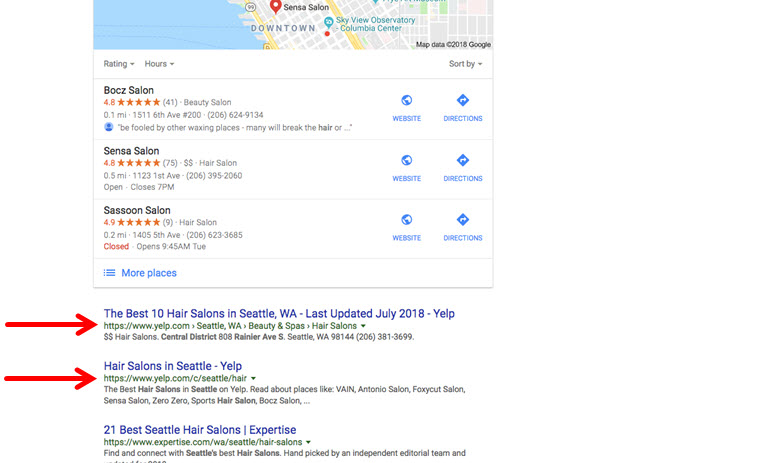 But, it’s really difficult to get reviews on Yelp because of their extremely strict filter. Also, Yelpers can tend to be a grumpy crowd, so you often see reviews skewing towards the negative.
But, it’s really difficult to get reviews on Yelp because of their extremely strict filter. Also, Yelpers can tend to be a grumpy crowd, so you often see reviews skewing towards the negative.
AND even worse, Yelp has a strict DO NOT ASK FOR REVIEWS policy. Come on, Yelp!
So, what’s a business owner to do to improve their standing on Yelp?
I have two suggestions for you:1) Create a check-in offer.
Create a check-in offer in the Yelp for Business dashboard. This can be something like a discount or a free gift for any user that checks in using the Yelp mobile app.
The nice thing about this is that you will be targeting people that are active Yelpers (they have the app installed), and even better, the next time they log into the site, Yelp will prompt them to write a review for the business they checked into. While you can’t ask your customers for reviews, if you use a check-in offer, Yelp will do the asking for you!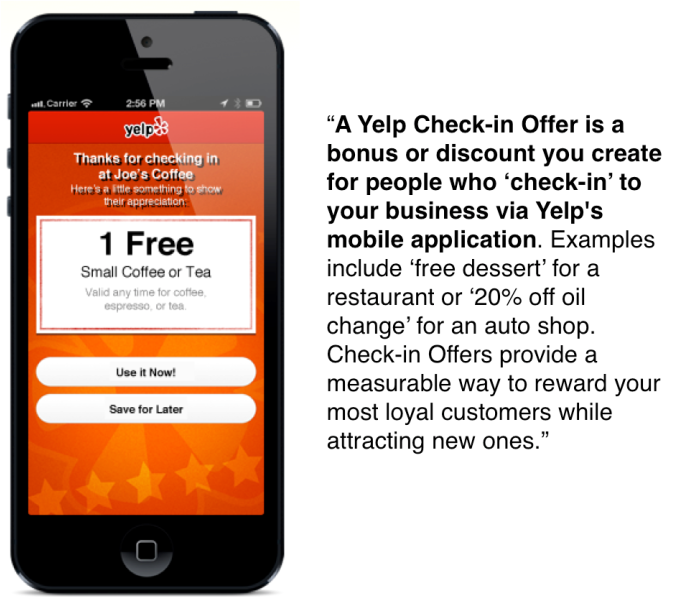 2) Find your customers that are active users on Yelp.
2) Find your customers that are active users on Yelp.
Yelp has a tool to “Find Friends on Yelp”. Using this, you can search emails one-by-one, or load up a mailing list. (For step-by-step instructions, check out our post on How to Get Yelp Reviews That Won’t Get Filtered and Improve Your Rating)
Once you have identified which of your customers are active users of Yelp, you can send a friendly email letting them know you are on Yelp, “Hey, FYI, we’re on Yelp! (but we’re totally not asking for a review).”
Ok, so there are a ton of tips in this post on little tweaks you can make to your review strategy. In the end, though, it really just comes down to a simple system. I have spoken with many businesses that are very successful at getting reviews, and they all seem to follow a process similar to these 4 steps:
If you just do this, you’re going to see a massive increase in the number of online reviews your business has. questions? Any tips I missed that you have seen help with getting more reviews? I’d love to hear from you in the comments!